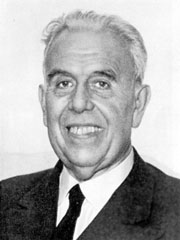The Center for Research and Documentation on World Language Problems (CRD) is an international research foundation created to study, document, and educate people about language problems, intercultural communication and international relations throughout the world. [1]
CRD was created in 1952 at the initiative of the World Esperanto Association. The Center's European headquarters is in Rotterdam, Netherlands, where its research library, the Hector Hodler Library, is located. It also operates as a unit of the University of Hartford, in the United States.
During its first two decades, CRD was guided by the Croatian jurist Ivo Lapenna. From 1974 to 2021, Humphrey Tonkin played a key role in leading the Center. Writers and researchers who have collaborated with the Center include: William Auld, Detlev Blanke, Marjorie Boulton, W. Collinson, Probal Dasgupta, Isaj Dratwer, Rudolf Haferkorn, Ulrich Lins, François Lo Jacomo, G. F. Makkink, Paul Neergaard, Robert Phillipson, Claude Piron, Juan Regulo Perez, R. Rokicki, Victor Sadler, Klaus Schubert, Tove Skutnabb-Kangas, Gaston Waringhien, and R. Wood.
Its current Board of Directors is headed by Mark Fettes and composed of Guilherme Fians, Michele Gazzola, Snehaja Venkatesh, Klaus Schubert and Humphrey Tonkin.

Esperanto is the world's most widely spoken constructed international auxiliary language. Created by Warsaw-based ophthalmologist L. L. Zamenhof in 1887, it was intended to be a universal second language for international communication, or "the international language". Zamenhof first described the language in Dr. Esperanto's International Language, which he published under the pseudonym Doktoro Esperanto. Early adopters of the language liked the name Esperanto and soon used it to describe his language. The word esperanto translates into English as "one who hopes".

L. L. Zamenhof developed Esperanto in the 1870s and '80s. Unua Libro, the first print discussion of the language, appeared in 1887. The number of Esperanto speakers have increased gradually since then, without much support from governments and international organizations. Its use has, in some instances, been outlawed or otherwise suppressed.

L. L. Zamenhof was an ophthalmologist who lived for most of his life in Warsaw. He is best known as the creator of Esperanto, the most widely used constructed international auxiliary language.

Dr. Esperanto's International Language, commonly referred to as Unua Libro, is an 1887 book by Polish ophthalmologist L. L. Zamenhof, in which he first introduced and described the constructed language Esperanto. First published in Russian on July 26 [O.S. July 14] 1887, the publication of Unua Libro marks the formal beginning of the Esperanto movement.

An international auxiliary language is a language meant for communication between people from all different nations, who do not share a common first language. An auxiliary language is primarily a foreign language and often a constructed language. The concept is related to but separate from the idea of a lingua franca that people must use to communicate.
The Esperantic Studies Foundation, abbreviatedESF is a non-profit organisation initiated in 1968 by Jonathan Pool, E. James Lieberman and Humphrey Tonkin, with the aim to further the understanding and practice of linguistic justice in a multicultural world, with a special focus on the study of interlinguistics and the role of Esperanto.

The Centre de documentation et d'étude sur la langue internationale in La Chaux-de-Fonds, Switzerland, was founded in 1967 by Claude Gacond. It is the main branch of the city's library and contains more than 20,000 bibliographic units. Interlinguistically neutral, CDELI aims to preserve documents in and about all kinds of constructed languages: it offers, in addition to Esperanto books and periodicals, the richest collections of materials about Volapük and Interlingue, among others.
Interlinguistics, as the science of planned languages, has existed for more than a century as a specific branch of linguistics for the study of various aspects of linguistic communication. Interlinguistics is a discipline formalized by Otto Jespersen in 1931 as the science of interlanguages, i.e. contact languages tailored for international communication. In more recent times, the object of study of interlinguistics was put into relation with language planning, the collection of strategies to deliberately influence the structure and function of a living language. In this framework, interlanguages become a subset of planned languages, i.e. extreme cases of language planning.

Nitobe Inazō was a Japanese author, educator, agricultural economist, diplomat, politician, and Protestant Christian during the late Meiji era.

Humphrey R. Tonkin is professor of English, and served as the 4th president of the University of Hartford. He is also a dedicated Esperantist.
The World Congress of Philosophy is a global meeting of philosophers held every five years under the auspices of the International Federation of Philosophical Societies (FISP). First organized in 1900, these events became firmly established after the Second World War. Each World Congress is sponsored by one of the member societies in a different country, which assumes responsibility for the organization of that Congress. The purpose of these events is to contribute to the development of professional relations between philosophers of all countries, promote philosophical education, and contribute to the impact of philosophical knowledge on global problems. The 24th World Congress of Philosophy was held in Beijing in August 2018. The 25th World Congress of Philosophy will take place in Rome in 2024.

Edmond Privat was a Francophone Swiss Esperantist. A historian, university professor, author, journalist and peace activist, he was a graduate of the University of Geneva and a lecturer for the World Peace Foundation. His collective works consist of original dramas, poems, stories, textbooks and books about the Esperanto movement.

A constructed language is a language whose phonology, grammar, and vocabulary, instead of having developed naturally, are consciously devised for some purpose, which may include being devised for a work of fiction. A constructed language may also be referred to as an artificial, planned or invented language, or a fictional language. Planned languages are languages that have been purposefully designed; they are the result of deliberate, controlling intervention and are thus of a form of language planning.

Aleksandr Dmitrievich Dulichenko is a Russian-Estonian Esperantist, linguist, and an expert in Slavic microlanguages currently living in Estonia. He is a professor at the University of Tartu in Tartu, where he is the head of the department of Slavic studies.
Cosmoglottics is a science that investigates world languages ; more specifically about universal artificial languages, its study and construction.

Alicja Sakaguchi is a Polish linguist and university professor in the fields of Esperanto and interlinguistics.

The Center for Intercultural Dialogue (CID) was established by the Council of Communication Associations (CCA) in March 2010. Intercultural dialogue occurs when members of different cultural groups, who hold conflicting opinions and assumptions, speak to one another in acknowledgment of those differences. As such, it forms "the heart of what we study when we study intercultural communication." The goal of CID is double: to encourage research on intercultural dialogue, but to do so through bringing international scholars interested in the subject together in shared intercultural dialogues about their work.

Grégoire Maertens is a West-Flemish Esperantist who was a member of the Estraro for the UEA from 1977 until 1992. From 1980 until 1986 he was president of the UEA, and an honorary member from 1993 onwards.

Mark Fettes is an Esperantist and university professor of education, and former President of the World Esperanto Association, known by its Esperanto initials as UEA.

Lingvo Internacia was an Esperanto periodical, published from 1895 to 1914. It was the second Esperanto periodical, following La Esperantisto (1889–1895). Lingvo Internacia was the central Esperanto publication in the years leading up to World War I, accompanied by La Revuo (1906–1914).